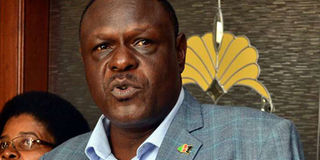Teachers brace for hard times as schools reopen

Kenya Secondary School Heads Association Chairman Indimuli Kahi during a media briefing on July 20, 2019. PHOTO | FILE | NATION MEDIA GROUP
What you need to know:
- A major source of frustration for the teachers, according to Mr Indimuli, will be congestion in classes, dormitories, laboratories, toilets and dining halls
- Mr Indimuli insists the government must raise infrastructure cash for schools and distribute it evenly.
- Another pernicious problem is the teacher shortage gripping the entire basic education and technical and vocational training sectors.
Teachers are bracing themselves for hard times as they prepare to reopen schools for the new calendar year next week.
The problems that plagued 2019 — teacher shortages, congestion in schools and capitation delays — are likely to persist or get worse in the New Year.
“We’re ready for the New Year but, of course, we are worried about the daunting challenges that await us. Many of the problems are those we have been dealing with because little has really changed,” Mr Kahi Indimuli, the Kenya Secondary School Headteachers Association chairman, said on the phone on Tuesday.
CONGESTION
A major source of frustration for the teachers, according to Mr Indimuli, will be congestion in classes, dormitories, laboratories, toilets and dining halls as a result of a spike in enrolment following the introduction of the policy on 100 per cent transition from primary to secondary school.
According to the Education ministry, more than 95 per cent of candidates who sat the 2018 Kenya Certificate of Primary Education examination were enrolled in Form One and will, next week, be going to Form Two.
In a week’s time, the country’s more than 10,000 secondary schools will have to absorb 1,083,456 Form Ones who completed primary school last year, in what will be the highest number of new admissions in four years. In 2018, the candidature stood at 964,119; 1,002,922 in 2017 and 942,021 in 2016.
“The government must support schools to improve and expand infrastructure so that learners can be comfortable and also have fun during their stay in school. Those parents who can afford to support schools upgrade their facilities should do so,” Mr Indimuli said.
EXPANSION
Education Cabinet Secretary George Magoha recently invited financially endowed parents to team up with school managers to raise funds for expansion of facilities. He was categorical, however, that no parent should be forced to contribute cash outside the official fees guidelines.
Mr Indimuli insists the government must raise infrastructure cash for schools and distribute it evenly.
However, headteachers find it hard to ask for donations since many parents consider themselves short-term stakeholders with only a four-year run. Many have embarked on aggressive campaigns to reach out to old boys and girls for well-structured and sustainable support.
Another pernicious problem is the teacher shortage gripping the entire basic education and technical and vocational training sectors.
Most schools are operating with a ratio of one teacher for 80 learners as opposed to the ideal 1:40. “This is not sustainable at all. Teachers can easily lose control of classes or fail to get to know their learners at an individual level. The Teachers Service Commission (TSC) must be more aggressive in putting across its case for more funds to hire more teachers,” Mr Indimuli said.
RAW DEAL
TSC statistics indicate that there is an overall teacher shortage of 96,345, which includes 38,054 at the primary school level and 58,291 at the post-primary school level.
“The projected shortages are expected to rise to 84,478 for secondary schools and 34,941 for primary schools by the year 2023,” says the National Education Sector Strategic Plan for 2018 to 2022.
The plan indicates that an average of 18,600 teachers have graduated from primary teacher training colleges over the last three years, while the government has been able to absorb about 29,000 teachers over the last five years.
The shortages have seen teachers take up more duties in and out of class to plug the gaps, leading to exhaustion and low morale, besides hurting the quality of learning.
“It’s a huge crisis in schools. We cannot hire teachers through the boards because we cannot afford to pay them. We’re just giving learners a very raw deal,” said a principal in a national school but who cannot be named for fear of reprisals.
RELEASE FUNDS
Still, the schools will have to contend with delays in the release of subsidy funds from the government. Mr Indimuli says government efforts to make education affordable for all may not bear fruit because of failure to release cash to schools promptly.
“The funds for the new term, which begins in just a few days, should be ready for use, but we’re yet to receive anything. The ministries of Finance and Education must really end these delays. They make running schools difficult,” he says.




